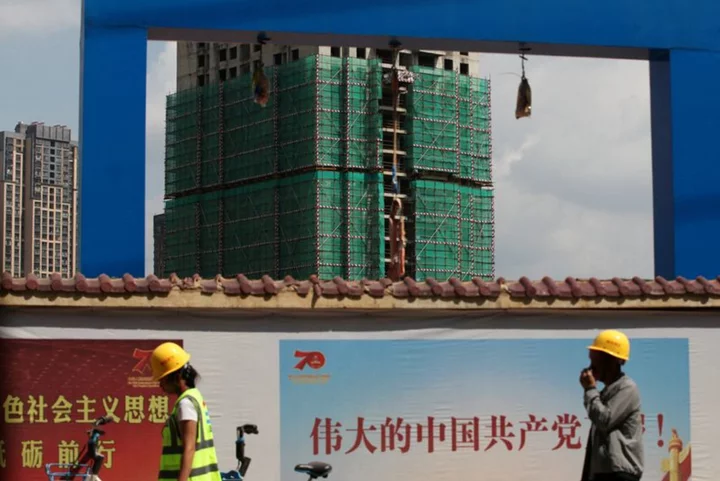By Clare Jim
HONG KONG The debt crisis at Country Garden, China's largest property developer before this year and once considered a financially sound company, has triggered fresh contagion fears just two years after China Evergrande Group defaulted.
WHAT COULD HAPPEN NEXT?
Since the sector's debt crisis unfolded in mid-2021, companies accounting for 40% of Chinese home sales have defaulted, most of them private property developers.
It has led to many unfinished homes, unpaid suppliers and creditors who are not only financial institutions but also ordinary folks who bought wealth management products linked to trust financing.
Many offshore bonds now trade at low double- or even single-digit cents on the dollar, and their share values have shrunk 90%. There is very little liquidity left in both the equity and debt markets as investors and creditors avoid the sector.
With home sales already very weak, the debt crisis could delay the prospect of a recovery of both the property market and the broader Chinese economy, in which real estate is a core pillar.
S&P Global Rating said on Wednesday it could adjust its forecast for property sales to a "descending staircase" figure from an "L" shaped recovery, if Country Garden officially defaulted.
Home-buyers could become even more wary of private developer brands, and home prices in many areas could come under greater pressure if Country Garden resorted to fire sales to raise cash.
Local government could tighten more the escrow accounts where presale funds are kept in order to ensure homes can be completed and delivered - a top priority set by Beijing.
These would in turn squeeze the sector more and lead to additional defaults even among state-backed developers.
HOW IS THIS TIME DIFFERENT?
Country Garden's quick slip into financial trouble did not shock the market as much as Evergrande's because most private developers had already defaulted. However, it emerged when the property market and the economy are in much worse shape.
While Country Garden's total liabilities of 1.4 trillion yuan ($191.7 billion) are only 59% as big as those at Evergrande, the world's most indebted developer, it has 3,121 projects across all China's provinces, compared to around 800 for Evergrande.
Evergrande was already insolvent at the time of default, but Country Garden currently still has more assets than liabilities. Analysts warn that Country Garden could become insolvent if it had to write off large inventories, and run into negative equity if its asset values dropped over time.
IS THERE SYSTEMIC RISK?
This week, news of missed payments on investment products by leading trust firm Zhongrong International Trust Co highlighted the outsized exposure of China's $3 trillion shadow banking sector to the property sector.
Increasing defaults by developers had already raised Chinese banks' non-performing loan ratios to 4.4% at the end of last year from 1.9% in 2020, Moody's said.
But market experts generally do not think China is on the brink of a "Lehman moment" with one company's failure cascading into a broader financial collapse, as financial institutions' exposure to the real estate sector has dropped in the past few years.
China's property sector accounts for more than half of global new home sales and home building, and it is the largest asset class in the world, with an estimated market value of around $62 trillion.
The next thing to watch is how regional governments, many of which rely on real estate revenue, manage their debt. Local-government financing vehicles (LGFVs) are estimated to hold 66 trillion yuan in total debt by the International Monetary Fund.
WILL CENTRAL GOVERNMENT INTERVENE?
China's Politburo, a top decision-making body of the ruling Communist Party, fuelled speculation more stimulus is on the way when it omitted the often-repeated phrase that "houses are for living in, not for speculation" from a statement in late July in which it pledged to adjust property policies in a timely manner.
But so far no bold stimulus measures have been announced, and views are split among industry experts whether they will eventuate.
Many analysts are hopeful that Beijing, which has so far refrained from state-funded bailouts, will roll out drastic measures in the coming weeks to stem the downward spiral.
Some analysts, however, question the tools that Beijing can use while maintaining a balancing act between providing support to the housing market and keeping debt in check.
($1 = 7.3040 Chinese yuan renminbi)
(Reporting by Clare Jim; Editing by Sumeet Chatterjee and Stephen Coates)

